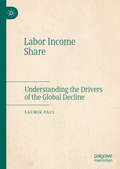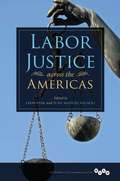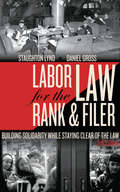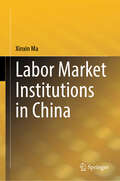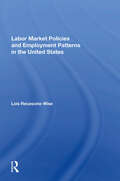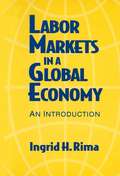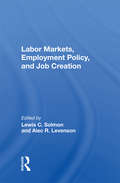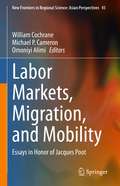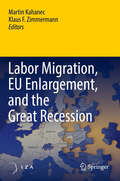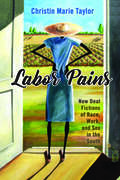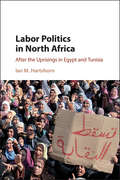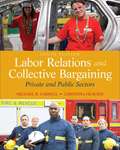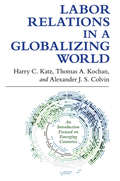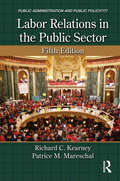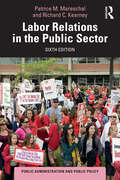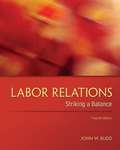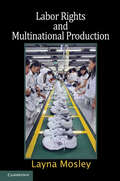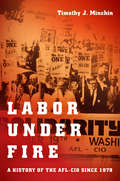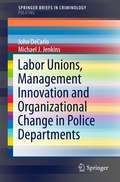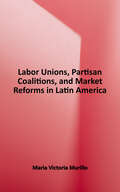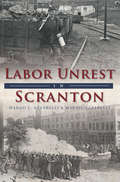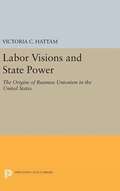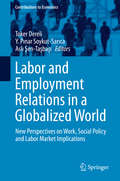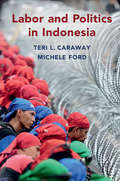- Table View
- List View
Labor Income Share: Understanding the Drivers of the Global Decline (Adb Institute Series On Development Economics Ser.)
by Saumik PaulThis book is about labor income share, which measures the share of national income paid in wages. The global share of income going towards labor is declining, which suggests a more unequal distribution of income. This has sparked debates about fair distribution of personal incomes among academics and policymakers alike. This book joins the discussion by bringing together recent developments in theoretical and empirical research on labor income share and novel insights on the measurement of the labor income share. The aim of this book is to help design policies to reduce inequality and provide useful knowledge to academics, policymakers from government agencies, policy aides in research institutions and think tanks, and broader audiences from public and private organizations.
Labor Justice across the Americas
by Leon Fink Juan PalacioOpinions of specialized labor courts differ, but labor justice undoubtedly represented a decisive moment in worker 's history. When and how did these courts take shape? Why did their originators consider them necessary? Leon Fink and Juan Manuel Palacio present essays that address these essential questions. Ranging from Canada and the United States to Chile and Argentina, the authors search for common factors in the appearance of labor courts while recognizing the specific character of the creative process in each nation. Their transnational and comparative approach advances a global perspective on the various mechanisms for regulating industrial relations and resolving labor conflicts. The result is the first country-by-country study of its kind, one that addresses a defining shift in law in the first half of the twentieth century. Contributors: Rossana Barragán Romano, Angela de Castro Gomes, David Díaz-Arias, Leon Fink, Frank Luce, Diego Ortúzar, Germán Palacio, Juan Manuel Palacio, William Suarez-Potts, Fernando Teixeira da Silva, Victor Uribe-Urán, Angela Vergara, and Ronny J. Viales-Hurtado.
Labor Law for the Rank & Filer: Building Solidarity While Staying Clear of the Law (Pm Press Ser.)
by Staughton Lynd Daniel GrossBlending cutting-edge legal strategies for winning justice at work with a theory of dramatic, bottom-up social change, this practical guide to workers' rights aims to make work better while reinvigorating the labor movement. A powerful organization model called "solidarity unionism" is explained, showing how the labor force can avoid the pitfalls of the legal system and utilize direct action to win fair rights. The new edition includes new cases governing fundamental labor rights and can be used not only by union workers, but can serve as a guerrilla legal handbook for any employee in this unstable economy.
Labor Law, Industrial Relations, and Employee Choice
by Richard N. Block John Beck Daniel H. KrugerDiscusses workplace conditions of the 1990s.
Labor Market Institutions in China
by Xinxin MaThis book examines labor market policy and institutional reforms and their impact on outcomes in the Chinese labor market, utilizing both institutional and empirical study perspectives. It furnishes readers with academic evidence essential for comprehending the transformation of labor policies and institutions within the Chinese context—an emerging market economy housing one of the largest workforces globally. The main content of this book is divided into two parts: (i) Social institutions and labor market policies, encompassing topics such as trade unions and union wage premiums, minimum wage regulations and wage distributions, labor contracts, employment security and the high education expansion policy. (ii) Wage and employment institutions in the workplace, including areas such as seniority wages, mandatory retirement systems, the wage-experience profile, the dual labor market phenomenon, discrimination against women and minority ethnic workers, work hours, work-family conflict, job satisfaction, and the influences of Communist Party of China membership on managerial promotions. This book presents academic evidence on these issues, grounded in institutional transition background, economic theories, and empirical studies. It draws upon various Chinese nationwide representative survey datasets. This book is highly recommended for readers interested in institutional transitions, seeking up-to-date and in-depth empirical studies on the associations between labor policies/institutions and labor market outcomes. It particularly appeals to those with an interest in the Chinese economy, labor policymakers, scholars with a background in econometric analysis, and managers in companies.
Labor Market Policies And Employment Patterns In The United States
by Lois Recascino WiseThe United States lacks a comprehensive and coordinated labor market policy. The components of U.S. labor market policy are derived from the activities and programs of many different agencies and Congressional committees. In addition to the Department of Labor, major aspects of labor market policy are sponsored by the Departments of Health and Human Services and Education, and the Social Security and Veterans Administrations. There is no centralized authority over these various activities and there is no one administrative agency responsible for the implementation of active labor market policies. This study seeks to evaluate the effectiveness of U.S. labor market policies that are presented and social and political barriers to policy impact are discussed.
Labor Markets in a Global Economy: A Macroeconomic Perspective
by Ingrid H. RimaThis introductory text on labour economics covers topics such as: the shift in America from a manufacturing-based economy to a service economy; the changes in the economic conditions in the US; the implications of NAFTA and GATT; and the labour markets.
Labor Markets, Employment Policy, And Job Creation (Milken Institute Series In Economics And Education)
by Lewis C. Solmon Alec R. LevensonThis clear, accessible volume provides a comprehensive overview of the ongoing debate over the determining factors of and key influences on employment growth and labor market training, education, and related policies in the United States. Drawing on the work of distinguished labor economists, the chapters tackle questions posed by job and skill demands in the "new high-tech economy" and explore sources of employment growth; productivity growth and its implications for future employment; government mandates, labor costs, and employment; and labor force demographics, income inequality, and returns to human capital. These topics are central concerns for government, which must judge every prospective policy proposal by its effects on employment growth. Washington keeps at least one eye firmly on the jobs picture, and public officials at every level are constantly aware of the issues surrounding American job security. The jobs issue reaches beyond this focus on the unemployment rate and on total employment, including the rate at which employment is seen as growing, the growth of real wages, the security of employment, returns to human capital, uncertainty about the education and training best suited for a world of rapidly changing economic conditions, and the distribution of the gains from growth across economic classes and population groups.
Labor Markets, Migration, and Mobility: Essays in Honor of Jacques Poot (New Frontiers in Regional Science: Asian Perspectives #45)
by William Cochrane Michael P. Cameron Omoniyi AlimiThis volume is devoted to three key themes central to studies in regional science: the sub-national labor market, migration, and mobility, and their analysis. The book brings together essays that cover a wide range of topics including the development of uncertainty in national and subnational population projections; the impacts of widening and deepening human capital; the relationship between migration, neighborhood change, and area-based urban policy; the facilitating role played by outmigration and remittances in economic transition; and the contrasting importance of quality of life and quality of business for domestic and international migrants. All of the contributions here are by leading figures in their fields and employ state-of-the art methodologies. Given the variety of topics and themes covered this book, it will appeal to a broad range of readers interested in both regional science and related disciplines such as demography, population economics, and public policy.
Labor Migration, EU Enlargement, and the Great Recession
by Martin Kahanec Klaus F. ZimmermannThis volume extends and deepens our knowledge about cross-border mobility and its role in an enlarged EU. More specifically, its main purpose is to enlighten the growing and yet rather uninformed debate about the role of post-enlargement migration for economic adjustment in the crisis-stricken labor markets of the Eurozone and the EU as a whole. The book addresses the political economy aspects of post-enlargement migration, including its broader political contexts, redistributive impacts, but also nationalization of the enlargement agenda. It also covers the experience of receiving and sending countries with post-enlargement migration and its role during the current crisis. Renowned experts in the field study, whether and how post-enlargement mobility has enabled the EU to absorb asymmetric economic shocks, how it has affected the European welfare systems, and whether it has contributed to the sustainability of the Eurozone. The authors also evaluate brain circulation as a sought-after vehicle of improved allocative efficiency of EU labor markets and propose a policy agenda for mobility in an enlarged EU.
Labor Pains: New Deal Fictions of Race, Work, and Sex in the South (Margaret Walker Alexander Series in African American Studies)
by Christin Marie TaylorFrom the 1930s to the 1960s, the Popular Front produced a significant era in African American literary radicalism. While scholars have long associated the black radicalism of the Popular Front with the literary Left and the working class, Christin Marie Taylor considers how black radicalism influenced southern fiction about black workers, offering a new view of work and labor.At the height of the New Deal era and its legacies, Taylor examines how southern literature of the Popular Front not only addressed the familiar stakes of race and labor but also called upon an imagined black folk to explore questions of feeling and desire. By poring over tropes of black workers across genres of southern literature in the works of George Wylie Henderson, William Attaway, Eudora Welty, and Sarah Elizabeth Wright, Taylor reveals the broad reach of black radicalism into experiments with portraying human feelings.These writers grounded interrelationships and stoked emotions to present the social issues of their times in deeply human terms. Taylor emphasizes the multidimensional use of the sensual and the sexual, which many protest writers of the period, such as Richard Wright, avoided. She suggests Henderson and company used feeling to touch readers while also questioning and reimagining the political contexts and apparent victories of their times. Taylor shows how these fictions adopted the aesthetics and politics of feeling as a response to New Deal–era policy reforms, both in their successes and their failures. In effect, these writers, some who are not considered a part of an African American protest tradition, illuminated an alternative form of protest through poignant paradigms.
Labor Politics in North Africa: After the Uprisings in Egypt and Tunisia
by Ian M. HartshornThe Arab Uprisings of 2010 and 2011 had a profound effect on labor politics in the region, with trade unions mobilizing to an extent never before seen. How did these formerly quiescent trade unions become militant? What linkages did they make to other social forces during and after the revolutions? And why did Tunisian unions emerge cohesive and influential while Egyptian unions were fractured and lacked influence? Following extensive interviews, Ian M. Hartshorn answers these questions and assesses how unions forged alliances, claimed independence, and cooperated with international groups. Looking at institutions both domestically and internationally, he traces the corporatist collapse and the role of global labor in offering training and new possibilities for disgruntled workers. With special attention to the relationship with rising Islamist powers, he also examines the ways in which political parties tried to use labor, and vice versa, and provides a detailed study of the role of labor in ousting the first Islamist governments.
Labor Relations and Collective Bargaining: Private and Public Sectors
by Michael R. Carrell Christina HeavrinBring your best case to the table by putting theory into practice with this guide to labor relations, unions, and collective bargaining. Labor Relations and Collective Bargaining: Cases, Practice, and Law introduces readers to collective bargaining and labor relations. This text is concerned with application, as well as coverage of labor history, laws, and practices.
Labor Relations in a Globalizing World
by Thomas A. Kochan Alexander J. Colvin Harry C. KatzCompelled by the extent to which globalization has changed the nature of labor relations, Harry C. Katz, Thomas A. Kochan, and Alexander J. S. Colvin give us the first textbook to focus on the workplace outcomes of the production of goods and services in emerging countries. In Labor Relations in a Globalizing World, they draw lessons from the United States and other advanced industrial countries to provide a menu of options for management, labor, and government leaders in emerging countries. They include discussions based in countries such as China, Brazil, India, and South Africa which, given the advanced levels of economic development they have already achieved, are often described as "transitional," because the labor relations practices and procedures used in those countries are still in a state of flux.Katz, Kochan, and Colvin analyze how labor relations functions in emerging countries in a manner that is useful to practitioners, policymakers, and academics. They take account of the fact that labor relations are much more politicized in emerging countries than in advanced industrialized countries. They also address the traditional role played by state-dominated unions in emerging countries and the recent increased importance of independent unions that have emerged as alternatives. These independent unions tend to promote firm- or workplace-level collective bargaining in contrast to the more traditional top-down systems. Katz, Kochan, and Colvin explain how multinational corporations, nongovernmental organizations, and other groups that act across national borders increasingly influence work and employment outcomes.
Labor Relations in the Public Sector (Public Administration and Public Policy #No. 21)
by Richard C. Kearney Patrice M. MareschalSince publication of the fourth edition of Labor Relations in the Public Sector, public sector unions have encountered strong headwinds in many parts of the U.S. Membership is falling in some jurisdictions, public opinion has shifted against the unions, and political forces are leaning against them. Retaining the structure that made the previous editions so popular, this fifth edition incorporates a complete round of updates, particularly sections on recent trends in membership figures, new legislation, and new politics as they influence bargaining rights. See What’s New in the Fifth Edition: Up to date examination and analysis of public sector labor relations and collective bargaining Important changes in the public labor relations and unionization landscape Updated analysis of the financial and human resource outcomes of collective bargaining in the public sector Collective bargaining institutions and processes in government Completely updated in terms of the scholarly and professional literature and relevant events, the new edition identifies and explains the implications of the new collective bargaining environment, including financial and human resource management issues and outcomes. As in previous editions, collective bargaining and labor relations are addressed at all levels of government, with comparisons to the private and nonprofit sectors. Designed to be classroom friendly, it includes discussions of the most recent literature and case studies as well as end-of-chapter assignments and quizzes. Practical tips and advice are offered for those engaged in collective bargaining and labor relations.
Labor Relations in the Public Sector (Public Administration and Public Policy)
by Richard C. Kearney Patrice M. MareschalIn the last decade, public sector unions have encountered threats in the form of privatization of public services and the retrenchment of collective bargaining rights, as well as opportunities in increasing labor union popularity and activity. Retaining the structure that made the previous editions so popular, Labor Relations in the Public Sector, Sixth Edition has been completely revised to explore the most recent trends in membership figures, new legislation, court decisions, executive orders, and new politics as they influence bargaining rights. Updates include: Thorough examination and analysis of contemporary public sector labor relations and collective bargaining Careful exploration of important recent changes in the public labor relations and unionization landscape Complete analysis of financial and human resource outcomes of recent collective bargaining in the public sector Detailed investigation of collective bargaining institutions and processes in government In keeping with prior editions, the sixth edition addresses collective bargaining and labor relations at all levels of government, with comparisons to the private and nonprofit sectors. Designed to be classroom-friendly, this text includes discussions of the most recent literature and case studies, as well as end-of-chapter assignments. Labor Relations in the Public Sector speaks to multiple audiences including academics, students, and practitioners, and practical tips and advice are offered for those engaged in collective bargaining and labor relations. It is vital reading for undergraduate and graduate students in fields including public administration, public policy, political science, and labor studies. This book is also relevant to scholars of comparative policy, politics, and labor.
Labor Relations: Striking a Balance (Fourth Edition)
by John W. Budd<p>John Budd continues to present the most dynamic, engaging approach to understanding labor relations in the 21st century with Labor Relations, 4/e. This textbook presents labor relations as a system for balancing employment relationship goals (efficiency, equity, and voice) and the rights of labor and management. <p>By weaving these themes with the importance of alternative perspectives on the nature of the employment relationship throughout the text, students can learn not only how the traditional labor relations processes work, but also why these processes exist and how to evaluate whether they are working. In this way, students can develop a deeper understanding of labor relations that will help them successfully navigate a contemporary labor relations system that faces severe pressures requiring new strategies, policies, and practices.</p>
Labor Rights and Multinational Production
by Layna MosleyLabor Rights and Multinational Production investigates the relationship between workers' rights and multinational production. Mosley argues that some types of multinational production, embodied in directly owned foreign investment, positively affect labor rights. But other types of international production, particularly subcontracting, can engender competitive races to the bottom in labor rights. To test these claims, Mosley presents newly generated measures of collective labor rights, covering a wide range of low- and middle-income nations for the 1985–2002 period. Labor Rights and Multinational Production suggests that the consequences of economic openness for developing countries are highly dependent on foreign firms' modes of entry and, more generally, on the precise way in which each developing country engages the global economy. The book contributes to academic literature in comparative and international political economy, and to public policy debates regarding the effects of globalization.
Labor Under Fire: A History of the AFL-CIO since 1979
by Timothy J. MinchinFrom the Reagan years to the present, the labor movement has faced a profoundly hostile climate. As America's largest labor federation, the AFL-CIO was forced to reckon with severe political and economic headwinds. Yet the AFL-CIO survived, consistently fighting for programs that benefited millions of Americans, including social security, unemployment insurance, the minimum wage, and universal health care. With a membership of more than 13 million, it was also able to launch the largest labor march in American history--1981's Solidarity Day--and to play an important role in politics.In a history that spans from 1979 to the present, Timothy J. Minchin tells a sweeping, national story of how the AFL-CIO sustained itself and remained a significant voice in spite of its powerful enemies and internal constraints. Full of details, characters, and never-before-told stories drawn from unexamined, restricted, and untapped archives, as well as interviews with crucial figures involved with the organization, this book tells the definitive history of the modern AFL-CIO.
Labor Unions, Management Innovation and Organizational Change in Police Departments
by John Decarlo Michael J. JenkinsThis Brief examines the role of Police Unions in law enforcement policy development. It provides an overview of the historical and political background of police labor unions, and takes a critical look at the shifting perception of labor unions from generally positive to somewhat negative, to compare this perception with their real impact. It examines the perceived role that unions play, whether positive, negative, or neutral in the development and advancement of contemporary law enforcement agencies and their respective policies. This work provides a multisite survey of police administrators' views and opinions on police union impact on a variety of police functions including: delivery of services, prevention of crime and disorder, and interaction with the public. The results of this research provide a comprehensive look at ways to improve the ways police departments operate and how they improve and enhance legitimacy in their communities. It provides a context for the current state of the public sector labor relations environment. It will be of interest to researchers in criminology and criminal justice, police science, and public policy.
Labor Unions, Partisan Coalitions, and Market Reforms in Latin America (Cambridge Studies In Comparative Politics Series)
by Maria Victoria MurilloDue to economic crises, labor parties followed economic policies that hurt labor unions during the 1990s, such as trade liberalization and privatization. This book explains why labor unions resisted on some occasions and submitted on others and what the consequences of their actions were by studying three countries: Argentina, Mexico, and Venezuela. The comparison between the experiences of the three countries and five different sectors in each country shows the importance of politics in explaining labor reactions and their effects on economic policies.
Labor Unrest in Scranton
by Marnie Azzarelli Margo L. AzzarelliOn an August morning in 1877, a dispute over wages exploded between miners and coal company owners. A furious mob rushed down Lackawanna Avenue only to be met by a deadly hail of bullets. With its vast coal fields, mills and rail lines, Scranton became a hotbed for labor activity. Many were discontented by working endless and dangerous hours for minimal pay. The disputes mostly ended in losses for labor, but after a strike that lasted more than one hundred days, John Mitchell helped win higher wages, a shorter workday and better working conditions for coal miners. The legendary 1902 Anthracite Coal Strike Commission hearings began in Scranton, where famed lawyer Clarence Darrow championed workers' rights. Local authors Margo and Marnie Azzarelli present this dramatic history and its lasting legacy.
Labor Visions and State Power: The Origins of Business Unionism in the United States (Princeton Studies In American Politics: Historical, International, and Comparative Perspectives)
by Victoria C. HattamWhy has labor played a more limited role in national politics in the United States than it has in other advanced industrial societies? Victoria Hattam demonstrates that voluntarism, as American labor's policy was known, was the American Federation of Labor's strategic response to the structure of the American state, particularly to the influence of American courts. The AFL's strategic calculation was not universal, however. This book reveals the competing ideologies and acts of interpretation that produced these variations in state-labor relations.
Labor and Employment Relations in a Globalized World
by Toker Dereli Y. Pinar Soykut-Sarica Asli Şen-TaşbaşiThis book explores the new challenges for work and employment relations in the wake of globalization. It describes contemporary developments and ways in which labor relations systems are evolving around the world and in Turkey. Authors combine the latest information with in-depth insights on a variety of issues. The implications of international trade for employment, the dichotomy between competitiveness and meeting international labor standards, the multinationals' effects on labor relations, social policy implications of American higher education, the search for the right regulatory balance between labor flexibility and job security, challenges faced in establishing temporary work agencies, the role of skills training and providing women with micro credits to overcome informal employment problems are just some of the issues analyzed in this book. Thus, the contributions from Turkish and international institutions offer a valuable overview of the ongoing discussions in the field of labor economics and employment relations.
Labor and Politics in Indonesia (Cambridge Studies in Contentious Politics)
by Teri L. Caraway Michele FordTwo decades after Indonesia's transition to democracy, its labor movement has emerged as a vibrant and influential political actor. Labor and Politics in Indonesia provides the first in-depth analysis of this development, investigating how a structurally weak labor movement carved out a strategic foothold in a country with no recent history of union engagement in politics. Caraway and Ford show how Indonesia's labor movement achieved many of its goals first through the disruptive power of contentious politics and later by combining street and electoral politics. Labor and Politics in Indonesia challenges the dominant theoretical approaches in the study of Indonesian politics, demonstrating how this movement became an active, and surprisingly effective, participant in Indonesia's democracy. Caraway and Ford break new theoretical ground in their analysis of how legacies of authoritarianism, the post-transition political opportunity structure, and the tactical creativity of Indonesia's unions combined to propel Indonesia's labor movement to success.
